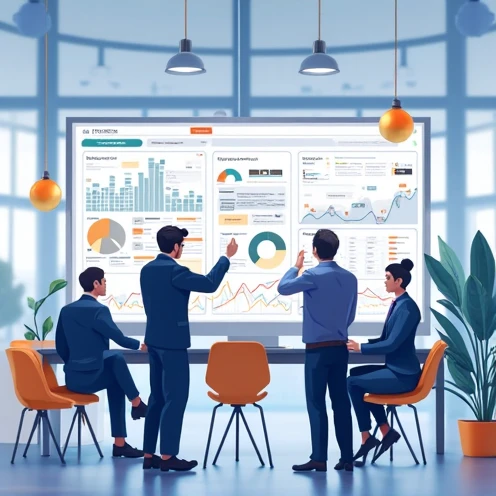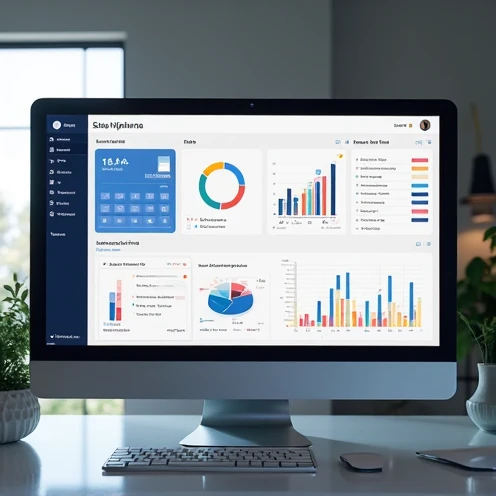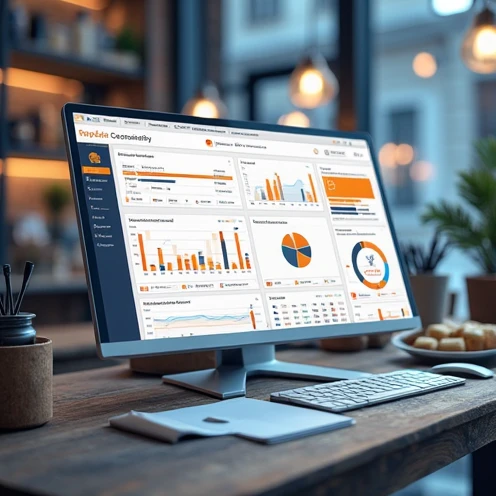Enterprise CRM Solutions are transforming how businesses interact with customers, streamline operations, and scale their growth. In today’s digital economy, it’s not enough to just store contact details—you need smart systems that help you understand, predict, and respond to customer behavior in real time.
Iklan Google AdSense
With the right CRM, businesses can track every interaction, personalize every message, and automate tedious tasks—all while gaining deep insights into sales, marketing, and service performance.
What Exactly Are Enterprise CRM Solutions?
Enterprise CRM Solutions are robust platforms designed for large-scale operations that demand seamless coordination between multiple departments. Unlike simple CRM tools, enterprise-level solutions can manage massive customer datasets, intricate workflows, and advanced reporting.
Iklan Google AdSense
They’re built to integrate with other enterprise software—ERP, helpdesk, email marketing systems—and offer scalability as your business grows. This makes them ideal for corporations with regional offices, multinational operations, or diverse customer bases.
These solutions typically include features such as AI automation, customer journey tracking, omnichannel communication, and detailed analytics dashboards. Their primary goal is simple: make customer relationships stronger and smarter.
The Shift From Basic CRM to Enterprise-Level Intelligence
As businesses grow, so do their data needs. Basic CRM tools often fall short when handling cross-functional collaboration, data analysis, and enterprise-wide visibility. That’s when organizations shift to enterprise-grade platforms.
With Enterprise CRM Solutions, everything becomes centralized. Sales, marketing, customer service, and even finance teams can work from a single source of truth. This not only saves time but also reduces data duplication and miscommunication.
By offering a panoramic view of each customer, these platforms empower businesses to serve with precision, address concerns proactively, and predict future trends.
Advanced Automation Drives Operational Efficiency
One key advantage of Enterprise CRM Solutions is automation. Manual data entry, repetitive email follow-ups, lead routing—these can all be automated. That frees up your team to focus on what matters most: customer engagement.
Additionally, automated workflows ensure consistency. For example, a new lead can be automatically assigned to a salesperson based on region or product interest. Follow-ups can be triggered by customer actions, improving lead conversion rates significantly.
The beauty of this automation is that it doesn’t sacrifice personalization. You can still customize messages, content, and touchpoints—at scale.
Boosting Sales Productivity with CRM Tools
Sales teams thrive when they’re not bogged down by admin tasks. Enterprise CRM platforms offer pipeline management tools that visualize every stage of the sales journey, from prospecting to post-sale engagement.
Reps can set reminders, track deal progress, and access complete customer histories—all from one dashboard. Even better, integrated calling tools and email tracking provide immediate context before every interaction.
The result? Sales teams that are informed, efficient, and focused on closing more deals.
Marketing and CRM: A Match Made in Digital Heaven
When CRM and marketing teams work in silos, customers get inconsistent experiences. But with an enterprise CRM in place, marketing campaigns can be more strategic and better aligned with sales.
For instance, lead scoring models built into the CRM can identify the most qualified prospects. Marketing automation features then nurture these leads with personalized emails and content.
By using real-time data, marketers can tweak campaigns instantly and target audiences based on behavior, location, and purchase history.
Customer Support That Anticipates, Not Just Responds
Enterprise CRM Solutions take customer service to the next level. Support agents can access full conversation histories, purchase records, and previous issues, allowing them to resolve problems faster and more empathetically.
Moreover, integrations with chatbots and AI assistants enable 24/7 support. Common questions can be answered instantly, while complex issues are routed to the right agents.
Advanced CRMs also offer service-level agreement (SLA) tracking and feedback tools, so you’re not just solving problems—you’re improving continuously.
AI and Predictive Intelligence Set Enterprise CRM Apart
Modern CRMs are powered by artificial intelligence. Predictive lead scoring tells your sales team who’s most likely to convert. Sentiment analysis can detect unhappy customers before they churn.
Even email subject lines can be optimized using AI. These features aren’t gimmicks—they’re tools that sharpen your competitive edge.
By leveraging AI, businesses become proactive rather than reactive. The system learns from past behaviors to recommend next steps, improve efficiency, and enhance customer satisfaction.
Seamless Integration with Other Enterprise Tools
Enterprise CRM Solutions aren’t standalone platforms. They integrate smoothly with other core business tools: accounting software, ERP systems, project management platforms, and email clients.
This integration ensures real-time data flow across departments. For example, the finance team can view CRM data to predict revenue, while HR can analyze which reps are hitting sales goals.
The result is a more agile, data-driven business that can pivot quickly and make informed decisions.
Data Security and Compliance Are Top Priorities
Customer data is sensitive—and valuable. That’s why top-tier enterprise CRMs include robust security measures like role-based access, multi-factor authentication, and encryption.
In addition, many solutions help businesses comply with regulations such as GDPR, HIPAA, or SOC 2. You can set user permissions, monitor access logs, and even automate compliance reporting.
With growing concerns about data privacy, having a secure CRM builds trust with your customers and reduces risk.
Choosing the Right Enterprise CRM Solution
Every business has unique needs. While Salesforce may work for one company, Microsoft Dynamics or Zoho CRM may be a better fit for another.
Look for scalability, ease of use, integration capabilities, and support. Consider whether you need industry-specific features, like healthcare compliance or e-commerce connectors.
Most importantly, involve end-users in the selection process. A powerful CRM is useless if your team doesn’t adopt it. Training, support, and customization options should all play a role in your final decision.
Iklan Bersponsor Google






